make sense
四级词汇详解
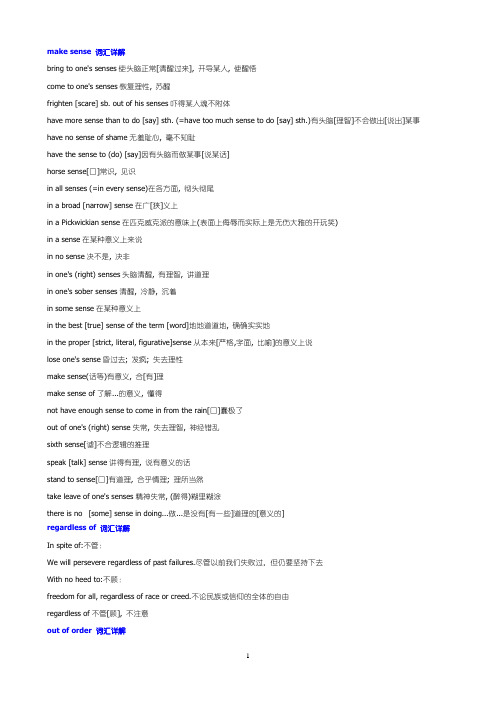
make sense 词汇详解bring to one's senses使头脑正常[清醒过来], 开导某人, 使醒悟come to one's senses恢复理性, 苏醒frighten [scare] sb. out of his senses吓得某人魂不附体have more sense than to do [say] sth. (=have too much sense to do [say] sth.)有头脑[理智]不会做出[说出]某事have no sense of shame无羞耻心, 毫不知耻have the sense to (do) [say]因有头脑而做某事[说某话]horse sense[口]常识, 见识in all senses (=in every sense)在各方面, 彻头彻尾in a broad [narrow] sense在广[狭]义上in a Pickwickian sense在匹克威克派的意味上(表面上侮辱而实际上是无伤大雅的开玩笑)in a sense在某种意义上来说in no sense决不是, 决非in one's (right) senses头脑清醒, 有理智, 讲道理in one's sober senses清醒, 冷静, 沉着in some sense在某种意义上in the best [true] sense of the term [word]地地道道地, 确确实实地in the proper [strict, literal, figurative]sense从本来[严格,字面, 比喻]的意义上说lose one's sense昏过去; 发疯; 失去理性make sense(话等)有意义, 合[有]理make sense of了解...的意义, 懂得not have enough sense to come in from the rain[口]蠢极了out of one's (right) sense失常, 失去理智, 神经错乱sixth sense[谑]不合逻辑的推理speak [talk] sense讲得有理, 说有意义的话stand to sense[口]有道理, 合乎情理; 理所当然take leave of one's senses精神失常, (醉得)糊里糊涂there is no [some] sense in doing...做...是没有[有一些]道理的[意义的]regardless of 词汇详解In spite of:不管:We will persevere regardless of past failures.尽管以前我们失败过,但仍要坚持下去With no heed to:不顾:freedom for all, regardless of race or creed.不论民族或信仰的全体的自由regardless of不管[顾], 不注意out of order 词汇详解in order按照顺序; 挨次;整齐; 整洁;恰当, 正确; 符合程序in order that ...为了..., 目的在于...in order to为了(做某事), 以便(做某事)in order to do sth.为了(做某事), 以便(做某事)out of order次序紊乱;(机器等)失灵; 出故障;有病;违反议事规则take charge of 词汇详解have (the) charge of负责..., 主管...in charge主管, 负责, 掌管;在...管辖之下, 由...照顾;在拘留中in charge of;负全责, 经管, 照顾;在...掌管之下, 由...经管in full charge负责; 勇猛向前in the charge of sb.由某人负责, 由某人照料[管理]take charge负责(照料, 保管等); 掌管, 接办;失去控制, 出了毛病take in charge负责照料, 引为己责;由警察拘留take charge of负责, 看管under the charge of在...看管[负责]之下rule out 词汇详解rule outTo prevent; preclude:避免;排除在外:The snowstorm ruled out their weekly meeting.暴风雪使他们一周一次的会议无法举行To remove from consideration; exclude:不考虑;排除出去:The option of starting over has been ruled out.重新开始这种选择已被排除考虑as a ruleIn general; for the most part:通常;总体上:As a rule, we take the bus.通常,我乘公共汽车traffic jam 词汇详解be jammed for time匆匆忙忙be jammed in陷入窘境be jammed with (people)拥挤; 挤满了(人)get into a jam[俚]陷入困境card jam卡片阻塞ice jam【水】冰塞log jam原木阻塞tape jam带阻塞, 带故障traffic jam交通拥挤; 交通阻塞without fail 词汇详解without failWith no chance of failure:一定,必定:没有失败的可能:Be here at noon without fail.一定在正午时到这里with a grain of salt词汇详解with a grain of saltWith reservations; skeptically:半信半疑地:有保留地;怀疑地:Take that advice with a grain of salt.半信半疑地接受建议under the weather 词汇详解make heavy weather ofTo exaggerate the difficulty of something to be done.夸大困难:夸大做某事的困难under the weatherSomewhat indisposed; slightly ill.不舒服:有些不舒服;微病thannks to 词汇详解no thanks toWithout the benefit of help from:不受益于:finally found the house, no thanks to these confusing directions.最后找到了房子,并不受益于这些混乱的指点thanks toOn account of; because of:因为:“our national good fortune in having avoided, thanks to the religion clauses of the First Amendment, the dismal possibilities of religious censorship”(Benno C. Schm idt, Jr.)“我们国家的已避免的好运,是由于第一修正案中的宗教条款,排除了宗教的可能性”(小本诺C.施米特)take advantage of 词汇详解take advantage ofTo put to good use; avail oneself of:利用:很好地使用;利用:take advantage of all educational opportunities.利用一切教育机会To profit selfishly by; exploit:占…的便宜:自私地获利;剥削:took advantage of the customer.欺骗消费者to advantageTo good effect; favorably:有利:产生良好效果;有利于:The roses were displayed to advantage in a blue vase.玫瑰插在蓝色的花瓶中,产生了良好的效果。
makesenseof和relateto的区别

makesenseof和relateto的区别
make sense of和relate to的⽤法不同。
Make sense of后⾯接被理解的事物,⽐如混乱的情形,⾼深的⽂章,对⼀切逻辑上的事情捋出头绪的意思,多⽤在⽐较为其所恼的情境。
relate to后⾯⼀般接⼈物或其处境,意为感同⾝受,仿佛可以经历相似的情感,更多是情绪上的⽽不是逻辑上的。
They tried to make sense of her mumblings.
他们试图听明⽩她在嘟哝些什么。
Provided you didn't try to make sense of it, it sounded beautiful.
只要不⾮得弄懂它的意思,它听上去还是很美的。
Many entries relate to the two world wars.
很多条⽬与两次世界⼤战有关。
Other recommendations relate to the details of how such data is stored.
其他建议涉及此类信息储存⽅⾯的⼀些细节。
通过高考题精讲 make sense

通过高考题精讲make senseSee, your computer has broken down again! It doesn’t ______ sense to buy the cheapest brand of computer just to save a few dollars. (天津卷)A. have B. make C. display D. bring解析:选择B。
这是make sense的用法瞧,你的电脑又坏了。
只为了省下几美元就买最便宜的电脑真是不理智。
=foolishSee, your computer has broken down again! It doesn’t make sense to buy the cheapest brand of computer just to save a few dollars.Make sense 常见2个意思:有意义,讲得通(易于理解);明智的(建立在理性基础上);Affordable plans that I can understand—and no contract to sign(签订)! Unlike other cell phones, Jitterbug has plans that make sense.有意义的(能理解的plans)When I grew up and entered the business world, I remember hearing my first boss say, “We all need to think like salespeople.”But it didn’t completely make sense.不易理解(“We all need to think like salespeople.”)。
sense的用法及例句

sense的用法及例句一、sense的基本意义和用法Sense是英语中的一个常用词汇,其基本含义为“感觉”、“意识”或“知觉”。
它可以作为名词和动词使用。
作为名词,sense指的是人们通过感官获取信息和理解世界的能力;而作为动词,sense表示察觉、感知或意识到某种情感、现象或变化。
本文将详细介绍sense的多种用法,并提供相应例句进行说明。
二、作为名词的sense用法及例句1. 意义或含义:A strong sense of responsibility can lead to success.强烈的责任感有助于获得成功。
2. 感觉或知觉:She had a strange sense of being watched.她有一种被人监视的奇怪感觉。
3. 通感或直观认识:Animals have a keen sense of smell.动物具有敏锐的嗅觉。
4. 常识或道理:It is common sense not to play with fire.与火玩耍是常识性错误。
5. 直觉:Her mother's sixth sense told her something was wrong.她母亲的第六感告诉她出了点问题。
三、作为动词的sense用法及例句1. 察觉或察觉到某种感觉或现象:She sensed that something was wrong.她察觉到有些不对劲。
2. 感受到(…的存在):He sensed danger and decided to leave.他感受到了危险,决定离开。
3. 勉强察觉到或怀疑:I sense some hesitation in his voice.我察觉到他声音中有些犹豫。
4. 意识到(某种情绪):I could sense her frustration when she spoke.从她的言辞中我能感受到她的沮丧情绪。
四、sense在常见短语中的运用1. make sense:讲得通,有意义Her explanation didn't make any sense to me.她的解释对我来说毫无意义。
用makesense造句带翻译

用makesense造句带翻译Title: Using Makesense in Daily Life。
Makesense is a powerful tool that can help us makesense of the world around us. By using this tool, we can better understand complex situations, make better decisions, and improve our overall quality of life. In this article,we will explore how makesense can be used in daily life to improve our understanding of the world and make better decisions.1. Understanding Personal Relationships。
Personal relationships can be complex and difficult to navigate. By using makesense, we can better understand the dynamics of our relationships and make better decisions about how to interact with others. For example, if we are having trouble communicating with a friend or family member, we can use makesense to analyze the situation and identify the underlying issues. This can help us to develop bettercommunication skills and improve our relationships.2. Making Financial Decisions。
makesense什么意思

make sense什么意思make sense的中文释义为有意义;讲得通;言之有理,音标为[me?k sens]。
例句:All of these concepts make sense.这些概念都挺有意义。
make sense [me?k sens]有意义;讲得通;言之有理例句:1.To make sense, these figures should not be looked at in isolation.这些数据不应孤立起来看,否则就没有意义。
2.On the face of it that seems to make sense. But the figures don#39;t add up.乍一看,那好像讲得通。
但是数字对不上。
3.There are some stylistic elements in the statue that just don#39;t make sense.这座雕像中有一些风格上的成分毫无意义。
4.A nursery rhyme may not make sense and even seem contradictory.也许童谣本身并没有意义,内容甚至会显得有些自相矛盾。
5.Some Internet buzzwords can only make sense with the context of Internet.有一些网络流行语只有在网络语境下才讲得通。
6.It doesn#39;t make sense to buy the cheapest computer just to save a few dollars.为了省点钱而买最便宜的的电脑是没有意义的。
7.All of these concepts make sense.这些概念都挺有意义。
8.The poems may not make sense and even seem contradictory, but they are easy to learn and recite.这些诗歌可能没有意义,甚至看起来相互矛盾,但它们很容易学习和背诵。
make sense用法

make sense用法[make sense用法]在英语中,"make sense"是一个常用的短语,表示某事物或某种情况逻辑上合理或可理解。
它在口语和写作中都有广泛的应用。
本文将一步一步回答有关"make sense"用法的问题,以帮助读者更好地理解和运用这一常用短语。
第一部分:用法概述一、make sense的基本意思是"合乎逻辑"或"有意义"。
当我们想要表达某种观点、论述或解释是否逻辑上正确或情理上合理时,通常会使用这一短语。
例句:1. His explanation of the scientific theory made sense to me.(他对科学理论的解释对我来说是合乎逻辑的。
)2. The conclusion of the detective's investigation didn't make sense.(侦探调查的结论不合情理。
)二、"make sense"还可以指代某种行为或决定是否合理或符合常识。
例句:1. Waiting for hours to get a table at a restaurant doesn't make sense to me.(在餐馆等几个小时的桌子对我来说不合理。
)2. It doesn't make sense to buy a new car when the old one is still in good condition.(当旧车还保持良好状态时购买新车不合常理。
)第二部分:具体用法一、"make sense"常用于表达对某种解释或观点的理解和认同。
例句:1. Your explanation of the math problem makes sense.(你对这个数学问题的解释是合理的。
make sense的四种形式及例句

make sense的四种形式及例句以下是十条关于“make sense 的四种形式及例句”:1. “Make sense”本身呀,就像黑暗中的明灯,一下子就让事情清晰起来啦!比如说:What you said makes sense.(你说的有道理。
)2. “Makes no sense”那可就是完全没道理呀!就像在大雾中迷路一样。
Look, this plan makes no sense at all.(瞧,这个计划根本没道理。
)3. “Make sense of”是去搞明白呀,就像解开一团乱麻!Can you make sense of this poem?(你能理解这首诗吗?)4. “Make a lot of sense”那就是非常有道理啦,好比找到了宝藏!Your idea makes a lot of sense.(你的主意非常有道理。
)5. “Does it make sense?”这不是在问有没有道理吗?就像在叩问心灵呀!Does it make sense to spend so much money on a dress?(花那么多钱买条裙子有道理吗?)6. “It makes sense that”这就是理所当然的呀,好像太阳从东边升起一样自然!It makes sense that he is angry.(他生气是理所当然的。
)7. “Something makes sense”有些事情就是有道理呀,就如同找到了正确的钥匙!This explanation makes sense.(这个解释有道理。
)8. “Nothing makes sense”啥都没道理呀,仿佛世界都混乱了!I feel like nothing makes sense right now.(我现在觉得啥都没道理。
)9. “Make perfect sense”那简直太有道理啦,好比严丝合缝的拼图!What he said makes perfect sense.(他说的太有道理了。
sense的用法和搭配

sense的用法和搭配
Sense是一个普遍存在的英语单词,它在日常生活中可以用来描述感觉、判断、理解或推断。
常见的sense用法有:
1、Feel a sense of security 感到安全
2、Make sense 有意义,合理
3、Keep one’s sense of humor 保持幽默感
4、Have a sense of pride 感到自豪
5、A sense of responsibility 责任感
6、Lose one’s sense of direction 迷失方向。
此外,sense还可以与定冠词连用,表示特殊的感受或理解:
1、A common sense 常识
2、A sixth sense 第六感
3、A sense of anticipation 期待感
4、A sense of shame 羞愧感
5、A sense of injustice 不公正感
6、A sense of purpose 目标感。
另外,sense还可以与动词或形容词搭配表达出特殊的含义:
1、Comprehend the sense 领会感觉
2、Sense something special 感觉到一些特殊的东西
3、In a sense 从某种意义上来说
4、Out of sorts 感觉不对劲
5、Out of touch 失去联系
6、Overexcited 情绪过度激动。
总之,sense是一个极为有用的词汇。
它有很多种用法,可以描述感受、理解和推断,使我们的表达更加准确、生动、丰富。
make sense of 近义词
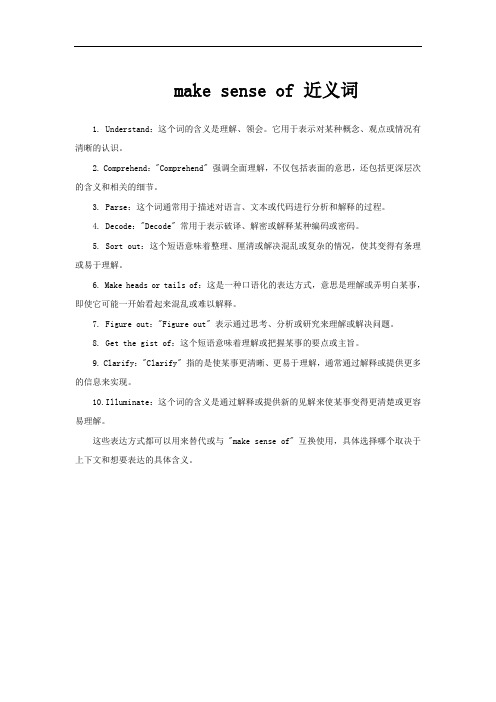
make sense of 近义词
1. Understand:这个词的含义是理解、领会。
它用于表示对某种概念、观点或情况有清晰的认识。
2. Comprehend:"Comprehend" 强调全面理解,不仅包括表面的意思,还包括更深层次的含义和相关的细节。
3. Parse:这个词通常用于描述对语言、文本或代码进行分析和解释的过程。
4. Decode:"Decode" 常用于表示破译、解密或解释某种编码或密码。
5. Sort out:这个短语意味着整理、厘清或解决混乱或复杂的情况,使其变得有条理或易于理解。
6. Make heads or tails of:这是一种口语化的表达方式,意思是理解或弄明白某事,即使它可能一开始看起来混乱或难以解释。
7. Figure out:"Figure out" 表示通过思考、分析或研究来理解或解决问题。
8. Get the gist of:这个短语意味着理解或把握某事的要点或主旨。
9. Clarify:"Clarify" 指的是使某事更清晰、更易于理解,通常通过解释或提供更多的信息来实现。
10.Illuminate:这个词的含义是通过解释或提供新的见解来使某事变得更清楚或更容易理解。
这些表达方式都可以用来替代或与 "make sense of" 互换使用,具体选择哪个取决于上下文和想要表达的具体含义。
sense的用法总结大全

sense的用法总结大全1. Sense作为名词的用法:a. 感觉,觉察力:He has a keen sense of smell.(他有敏锐的嗅觉。
)b. 意义,含义:What is the sense of this statement?(这个陈述的意义是什么?)c. 理智,判断力:He had the sense to leave when the argument got heated.(当争论激烈时,他有理智地离开了。
)d. 常识,常理:It's just common sense to wear a seatbelt while driving.(开车时系上安全带是常识。
)2. Sense作为动词的用法:a. 察觉,感知:I could sense his presence in the dark room.(我能感觉到他在黑暗的房间里。
)b. 意识到,意识到:I sense that something is not right.(我感到有些不对劲。
)c. 感到,觉得:I sense a bit of tension in the air.(我感觉到空气中有一丝紧张。
)3. Sense用作形容词时的用法:a. 明智的,合理的:It is a sense decision to invest in the stock market.(在股市投资是明智的决定。
)b. 合乎情理的,讲道理的:There must be a sense explanation for this behavior.(这种行为一定有合理的解释。
)4. Sense与其他词的搭配用法:a. Make sense: 有意义,讲得通:Her explanation makes sense.(她的解释很有道理。
)b. Common sense: 常识,常理:Using sunscreen is just common sense.(使用防晒霜是常识。
make sense的y文 -回复

make sense的y文-回复[make sense的y文]让我们一步一步回答一个问题:“为什么事物会有意义?”意义是一种主观而又复杂的概念,它在不同的情境和个体之间可能有不同的解释。
然而,我们可以从哲学、心理学和社会科学的角度来探讨事物为什么会有意义。
首先,意义与目的有着密切的关联,因为事物在实现目的时才会被认为有意义。
对于个人而言,目的可能是实现自己的梦想、追求个人成长和幸福,或是为他人带来快乐和帮助。
事物所固有的目的性可以帮助我们理解其意义。
例如,教育的目的是培养知识和能力,因此学习对于一个人来说是有意义的。
同样地,工作的目的是为自己和家人提供经济支持,因此工作对于生活也有着重要的意义。
其次,意义还与个体的价值观和信仰系统有着密切的关系。
每个人都有自己独特的价值观和信仰,这些价值观和信仰将决定他们对事物的看法和评价。
例如,一个人重视友情和人际关系,那么他可能会认为与朋友共度时光是有意义的。
而一个人更重视个人成就和职业发展,那么他可能会认为在事业上取得成功是有意义的。
因此,个体的价值观和信仰系统将直接影响他们对事物的意义的理解。
此外,社交互动和群体认同也会赋予事物一种意义。
人类是社会性动物,我们的生活离不开与他人的互动和群体认同。
社交互动可以为我们带来温暖和快乐,同时也会赋予我们的行为一种意义。
例如,参加慈善活动并帮助那些需要帮助的人会给我们一种存在的目的感和成就感,因为我们知道我们的行为对他人有积极的影响。
此外,与一个团体或组织建立紧密的联系也能赋予我们的生活意义。
比如,加入一个志愿者团队或组织,与志同道合的人们一起为共同的目标奋斗,这将使我们感到自身是有意义的一部分。
最后,寻求理解和探索世界也是赋予事物意义的一种方式。
人类天生具有好奇心和求知欲,我们渴望了解我们所处的世界。
从科学和哲学的角度来看,通过研究和思考我们可以发现事物的本质,从而赋予它们以意义。
例如,通过探索自然界和宇宙的奥秘,科学家们发现了这些事物的规律和原理,这给我们指示了我们所处的世界的意义。
makesense标注
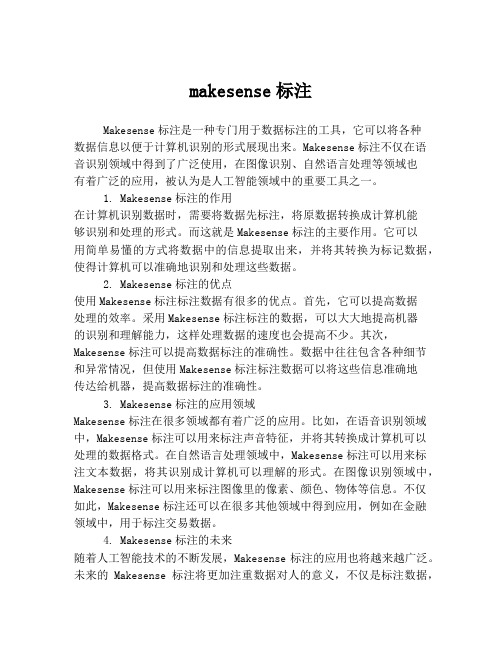
makesense标注Makesense标注是一种专门用于数据标注的工具,它可以将各种数据信息以便于计算机识别的形式展现出来。
Makesense标注不仅在语音识别领域中得到了广泛使用,在图像识别、自然语言处理等领域也有着广泛的应用,被认为是人工智能领域中的重要工具之一。
1. Makesense标注的作用在计算机识别数据时,需要将数据先标注,将原数据转换成计算机能够识别和处理的形式。
而这就是Makesense标注的主要作用。
它可以用简单易懂的方式将数据中的信息提取出来,并将其转换为标记数据,使得计算机可以准确地识别和处理这些数据。
2. Makesense标注的优点使用Makesense标注标注数据有很多的优点。
首先,它可以提高数据处理的效率。
采用Makesense标注标注的数据,可以大大地提高机器的识别和理解能力,这样处理数据的速度也会提高不少。
其次,Makesense标注可以提高数据标注的准确性。
数据中往往包含各种细节和异常情况,但使用Makesense标注标注数据可以将这些信息准确地传达给机器,提高数据标注的准确性。
3. Makesense标注的应用领域Makesense标注在很多领域都有着广泛的应用。
比如,在语音识别领域中,Makesense标注可以用来标注声音特征,并将其转换成计算机可以处理的数据格式。
在自然语言处理领域中,Makesense标注可以用来标注文本数据,将其识别成计算机可以理解的形式。
在图像识别领域中,Makesense标注可以用来标注图像里的像素、颜色、物体等信息。
不仅如此,Makesense标注还可以在很多其他领域中得到应用,例如在金融领域中,用于标注交易数据。
4. Makesense标注的未来随着人工智能技术的不断发展,Makesense标注的应用也将越来越广泛。
未来的Makesense标注将更加注重数据对人的意义,不仅是标注数据,更是将数据融入到更为智能化的人机交互中。
【十分钟学英语】Doesthismakesense?来学学这个成语
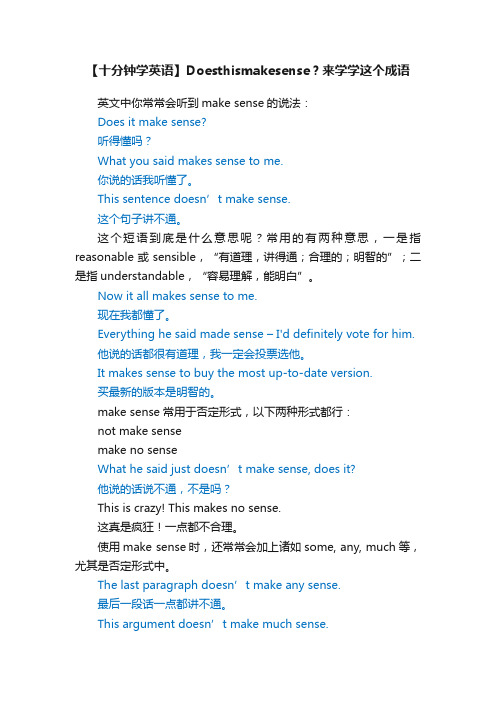
【十分钟学英语】Doesthismakesense?来学学这个成语英文中你常常会听到make sense的说法:Does it make sense?听得懂吗?What you said makes sense to me.你说的话我听懂了。
This sentence doesn’t make sense.这个句子讲不通。
这个短语到底是什么意思呢?常用的有两种意思,一是指reasonable或sensible,“有道理,讲得通;合理的;明智的”;二是指understandable,“容易理解,能明白”。
Now it all makes sense to me.现在我都懂了。
Everything he said made sense – I'd definitely vote for him.他说的话都很有道理,我一定会投票选他。
It makes sense to buy the most up-to-date version.买最新的版本是明智的。
make sense常用于否定形式,以下两种形式都行:not make sensemake no senseWhat he said just doesn’t make sense, does it?他说的话说不通,不是吗?This is crazy! This makes no sense.这真是疯狂!一点都不合理。
使用make sense时,还常常会加上诸如some, any, much等,尤其是否定形式中。
The last paragraph doesn’t make any sense.最后一段话一点都讲不通。
This argument doesn’t make much sense.这一争论没多大意义。
A: Can you understand me?B: No, I can’t understand you. You’re not making any sense.A:你懂我的意思吗?B:不,我不懂你的意思。
make sense的用法及例句
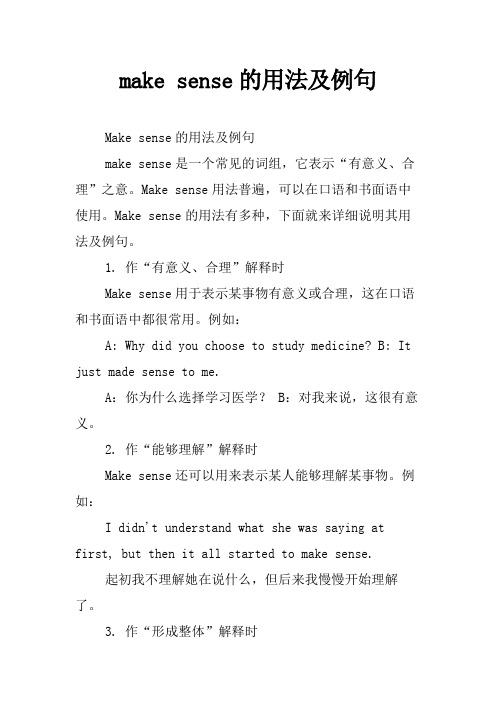
make sense的用法及例句Make sense的用法及例句make sense是一个常见的词组,它表示“有意义、合理”之意。
Make sense用法普遍,可以在口语和书面语中使用。
Make sense的用法有多种,下面就来详细说明其用法及例句。
1. 作“有意义、合理”解释时Make sense用于表示某事物有意义或合理,这在口语和书面语中都很常用。
例如:A: Why did you choose to study medicine? B: It just made sense to me.A:你为什么选择学习医学? B:对我来说,这很有意义。
2. 作“能够理解”解释时Make sense还可以用来表示某人能够理解某事物。
例如:I didn't understand what she was saying at first, but then it all started to make sense.起初我不理解她在说什么,但后来我慢慢开始理解了。
3. 作“形成整体”解释时Make sense也可以表示某些东西形成一个整体。
例如:All the pieces of the puzzle finally came together and it all made sense.所有拼图的部分最终拼合在一起,一切都变得有意义了。
4. 作“改变主意”解释时Make sense可以用来表示改变原有想法。
例如:I thought I wanted to go to law school, but now it doesn't make sense.我本以为要上法学院,但现在改变了主意。
5. 作“努力追求”解释时Make sense也可以用来表示努力追求某种目标。
例如:We have to work hard if we want our project to make sense.如果我们想要我们的项目有意义,就必须努力工作。
makesense

makesense2篇文章一:Makesense(上)在当今社会,人们对于信息的获取和传播需求愈发迫切。
从过去的纸质媒体到现如今的数字化平台,资讯的传递速度越来越快。
在这个信息爆炸的时代,我们是否足够理性地对待所接触到的信息呢?本文将讨论信息的真实性以及人们对待信息所表现出的反应。
首先,信息的真实性是人们接触信息时的首要问题。
随着互联网技术的飞速发展,越来越多的信息以及观点以各种形式呈现在我们面前,尤其是通过社交媒体等平台。
然而,这些信息的真实性很难保证。
很多人只是通过阅读信息的标题或者简短的内容就做出评论或者传播,而没有仔细核实信息的来源和真实性。
这种盲目传播可能会导致错误的观点得以传播和流行,对于公众舆论的形成和社会稳定产生不利影响。
其次,人们对待信息的态度也是关键。
人们往往受到自己的偏见和情绪的影响,选择性地接受和传播某些信息,忽略甚至否定与自己立场相悖的信息。
这种以偏概全的行为可能会导致人们对事实的认知出现偏差,从而对问题的解决产生干扰。
此外,人们在表达观点和争论时常常陷入情绪化的辩论,忽视了理性思考和相互尊重。
针对以上问题,我们需要树立正确的信息观念。
首先,我们应该保持怀疑的态度,对接收到的信息进行核实和验证,特别是对一些涉及敏感问题的文章和消息。
其次,我们应该培养理性的思维能力,通过多方面的了解和思考形成自己的观点。
我们也应该尊重不同意见和多元观点,避免以偏概全。
最后,我们应该注重自己的言行举止,遵循道德和法律的约束,在表达观点的同时维护秩序和和谐。
总之,信息的真实性和人们对待信息的态度对于一个社会的发展和稳定具有重要影响。
我们需要在信息爆炸的时代保持理性和怀疑的态度,培养自己的思辨能力,并且尊重多元观点。
只有在这样的基础上,我们才能够更好地利用信息资源,推动社会的进步与发展。
文章二:Makesense(下)在当今信息繁杂的社会中,如何辨别信息的真实性和正确对待信息成为了一个重要议题。
